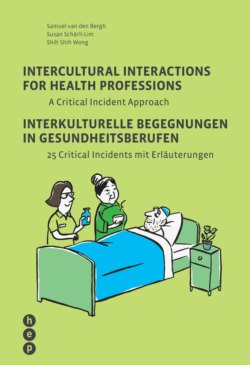Читать книгу Intercultural Interactions for Health Professions / Interkulturelle Begegnungen in Gesundheitsberufen (E-Book) - Samuel van den Bergh - Страница 9
На сайте Литреса книга снята с продажи.
CRITICAL INCIDENT 3: Hands Off!
ОглавлениеOtto Banz is an experienced senior occupational therapist working in a psychiatric outpatient clinic. He is treating Som Phon, an immigrant from Thailand who has lived in Berne for 15 years. He is diagnosed with an anxiety disorder after a traumatic incident. Today a round table discussion with his whole family is scheduled. As the patient’s wife, his two young sons and his brother-in-law arrive, Otto gently pats the two boys on their heads as a sign of affection. All the adults sigh in disbelief, the boys start to cry, Som Phon starts to shout at Otto, the brother-in-law walks towards Otto and stops in front of him. The family is ready to leave the room.
What possibly explains the behaviour of this family?
Please select the alternative(s) which could be the explanation(s)
1.Otto’s hand is dirty after having had his lunch and he is not aware of that. The adults are upset because Otto touches the boys’ heads with his dirty hand.
2.Otto uses his left hand to pat the boys’ head. In Thai culture, the use of the left hand is often considered rude.
3.A common belief amongst Thais is that one’s head is the most sacred part of the body and therefore touching the head is considered inappropriate.
4.The adults are angry because Otto does not follow the traditional Thai greeting customs. They feel disrespected. Instead of greeting the adults first, Otto reaches out his hand to pat the children.
Analysis
1.It is not indicated in the critical incident that Otto’s hand is dirty. This is not the answer.
2.As in many other cultures, the right hand is also considered the «good» hand in Thailand. It is used to pass and accept things even when gesturing. The use of the left hand is considered rude (Galanti, 2004). It is a possibility, but there is no evidence in the incident that suggests that Otto uses his left hand to touch the child’s head. There is a more likely reason for the misunderstanding. Please choose again.
3.This is the best possible answer. While patting a child’s head is considered to be a friendly or affectionate gesture in Western culture, it is considered taboo to many Asians to touch someone on the head (Galanti, 2004). They regard the head as a sacred part of the body. In Thailand, only family members or those who have established a bond with the family are allowed to touch the children’s head. It is believed that guardian angels are on the Thai’s heads and if anyone touches their children, the connection is severed and this can result in psychiatric illness or other ill luck.
To remedy the situation, Otto should not say anything, step back and let the family leave the room if it is a heated situation. After finding out what could have caused the upset, he should then contact Som Phon’s family by phone a couple of days later to apologise and ask if the boys are well. He should continue to follow up with the patient to regain his trust. Otto should be more conscious not to touch Asian patients’ heads in the future. He should be aware that ignorance about other cultures can ruin a relationship and it takes a longer time to regain a patient’s trust.
On the other hand, as Som Phon has resided in Switzerland for 15 years, he should be able to take the perspective of Swiss cultures to understand that Otto, being a Swiss, may not know much about Thai cultures. Otto’s gesture is just an expression of affection and he should not perceive it as an offence. It will be helpful if Som Phon acts as a peacemaker in the conflict by explaining Otto’s disrespectful conduct to his wife and brother-in-law. However, to avoid the same misunderstanding occurring in the future, Som Phon should inform Otto respectfully about this custom.
4.Thai society tends to be hierarchical; it is expected to greet the eldest person first before greeting the younger ones. While this is a possible reason, there is a better explanation. Please choose again.
